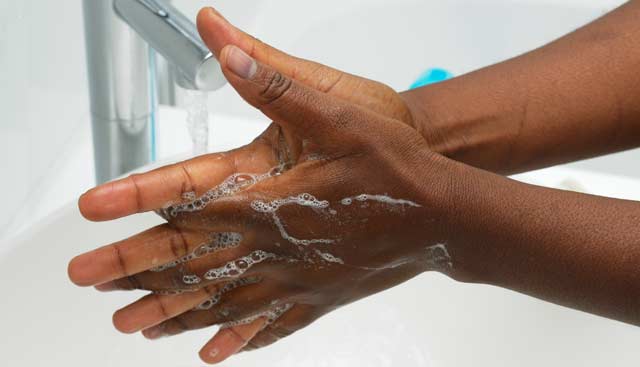
Five Questions With: Clinical Specialist Cassandra Vonnes on the Importance of Hand Washing
Each day your hands can come in contact with millions of germs from shared surfaces or people. If you touch your mouth, eyes or nose after contracting the germs the risk of sickness quickly increases. To observe "Clean Hands Week" (Sept. 17-23), we talked to clinical specialist, Cassandra Vonnes, about the importance of hand washing when it comes to preventing the spread of germs and sickness.
1. How often should you wash your hands and when is it most important to?
In the healthcare field, you should wash your hands before and after every patient contact. If you are in the community, clearly before you eat, after you use the restroom and anytime you touched widely shared surfaces (i.e. handrails or doorknobs). Another instance is when you go into the grocery store; make sure you’re using the complimentary cart wipes that sanitize the shopping cart handle. Touching common surfaces that other people have been touching is when you are the most susceptible to pick up germs on your hands.
2. Is there a correct technique for washing your hands? For example, how long should you wash your hands?
One thing that I teach new nursing students when washing their hands is to sing the “Happy Birthday” song or the “ABC’s” to themselves twice. That gives them a timeframe to wash the hands and nails thoroughly enough up to the wrist.
3. How can we prevent germs from leaving the restroom? For example, if you bring your phone, keys and purse into the bathroom with you.
You should never set down any object that you are going to carry with you in the restroom. It is important to utilize the hooks on the back of the stall door for bags and purses. You should also stick your phone in a pocket and not set the phone right on the bathroom floor. Many restrooms now have automatic water or paper towel dispensers. You want to turn off the water with a towel after you have finished washing your hands as well as open the restroom door with one so that your clean hand isn’t touching the shared surface. A common thing that happens is when people are done washing their hands, they turn off the water or grab the door handle, contracting more germs.
4. Can hand washing prevent sicknesses during flu season or just sickness in general? How important is it for cancer patients and hospital staff members to wash their hands?
Absolutely, washing your hands is the best line of defense against germs. We don’t realize how many shared germs we transmit all the time. We are always touching common surfaces, shaking hands and making physical contact with other people. The flu virus lives on those common surfaces and washing our hands is a way to reduce the chance of transmission with those germs.
Cancer patients are the most vulnerable, what the chemotherapy and radiation do is it wipes out their immune system to fight their cancer. If a normal immune was 10,000-cell count, a cancer patient might be one or two thousand. As the medical staff, washing our hands is our first way of keeping them safe. Patients should avoid high population areas as well as other people with illnesses. We want our patients to be good stewards of those caring for them, holding them accountable to washing their hands as well.
5. Is hand sanitizer a suitable substitute to washing your hands?
In many cases, it is. There are some bacteria such as C. difficile, a bacteria that can cause symptoms ranging from diarrhea to inflammation of the colon, that can live on surfaces and washing your hands with soap and water is the only appropriate way to kill the bacteria. Soap and water are always the best option, but hand sanitizer is also a suitable substitute for on-the-go cleaning. Do not use hand sanitizer when your hands are visibly dirty and make sure to use an alcohol-based sanitizer.
Five Questions With is an occasional series featuring Moffitt team members, patients and volunteers.
